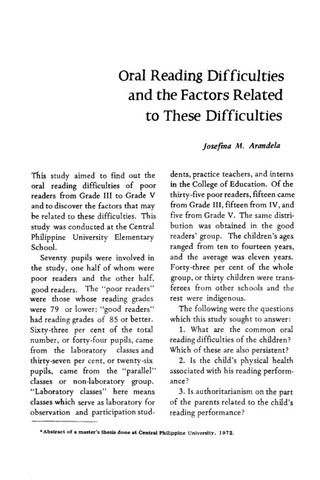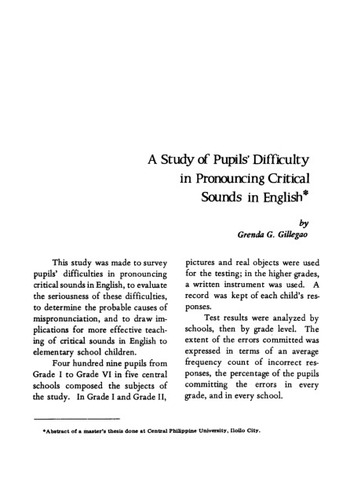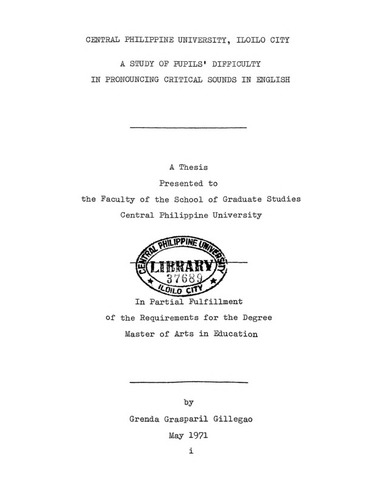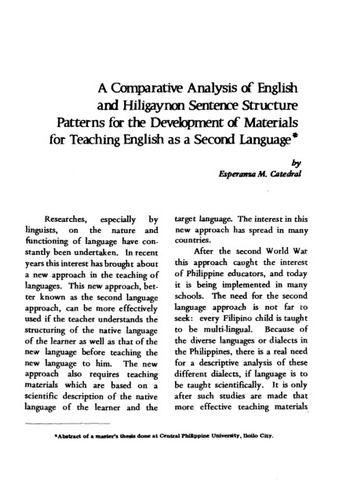Oral reading difficulties and the factors related to these difficulties
| dc.contributor.author | Arandela, Josefina M. | |
| dc.date.accessioned | 2022-05-31T05:24:37Z | |
| dc.date.available | 2022-05-31T05:24:37Z | |
| dc.date.issued | 1973 | |
| dc.identifier.citation | Arandela, J. M. (1973). Oral reading difficulties and the factors related to these difficulties. Southeast Asia Journal, 6(1), 17-19. | en_US |
| dc.identifier.uri | https://hdl.handle.net/20.500.12852/2074 | |
| dc.description | Journal article | en_US |
| dc.description.abstract | This study aimed to find out the oral reading difficulties of poor readers from Grade III to Grade V and to discover the factors that may be related to these difficulties. This study was conducted at the Central Philippine University Elementary School. Seventy pupils were involved in the study, one half of whom were poor readers and the other half, good readers. The “poor readers” were those whose reading grades were 79 or lower; “good readers” had reading grades of 85 or better. Sixty-three per cent of the total number, or forty-four pupils, came from the laboratory classes and thirty-seven per cent, or twenty-six pupils, came from the “parallel” classes or non-laboratory group. “Laboratory classes” here means classes which serve as laboratory for observation and participation studdents, practice teachers, and interns in the College of Education. Of the thirty-five poor readers, fifteen came from Grade III, fifteen from IV, and five from Grade V. The same distribution was obtained in the good readers’ group. The children’s ages ranged from ten to fourteen years, and the average was eleven years. Forty-three per cent of the whole group, or thirty children were transferees from other schools and the rest were indigenous. The following were the questions which this study sought to answer: 1. What are the common oral reading difficulties of the children? Which of these are also persistent? 2. Is the child’s physical health associated with his reading performance? 3. Is authoritarianism on the part of the parents related to the child’s reading performance? 4. Is the family’s socio-economic status related to the child’s reading performance? 5. Is mental ability associated with reading performance? 6. Is attendance in school related to reading performance? | en_US |
| dc.language.iso | en | en_US |
| dc.publisher | Central Philippine University | en_US |
| dc.subject.lcsh | Reading (Elementary) | en_US |
| dc.subject.lcsh | Reading | en_US |
| dc.subject.lcsh | English language | en_US |
| dc.subject.lcsh | English language--Study and teaching | en_US |
| dc.subject.lcsh | English language--Study and teaching (Elementary) | en_US |
| dc.subject.lcsh | English language--Pronunciation | en_US |
| dc.subject.lcsh | English language--Pronunciation by foreign speakers | en_US |
| dc.subject.lcsh | Central Philippine University--Students | en_US |
| dc.subject.lcsh | School children | en_US |
| dc.title | Oral reading difficulties and the factors related to these difficulties | en_US |
| dc.type | Article | en_US |
| dcterms.accessRights | Publicly accessible | en_US |
| dc.citation.firstpage | 17 | en_US |
| dc.citation.lastpage | 19 | en_US |
| dc.citation.journaltitle | Southeast Asia Journal | en_US |
| dc.citation.volume | 6 | en_US |
| dc.citation.issue | 1 | en_US |
| local.relation.associatedcontent | https://repository.cpu.edu.ph/handle/20.500.12852/994 Master's thesis | en_US |
Files in this item
This item appears in the following Collection(s)
-
Southeast Asia Journal [188]





